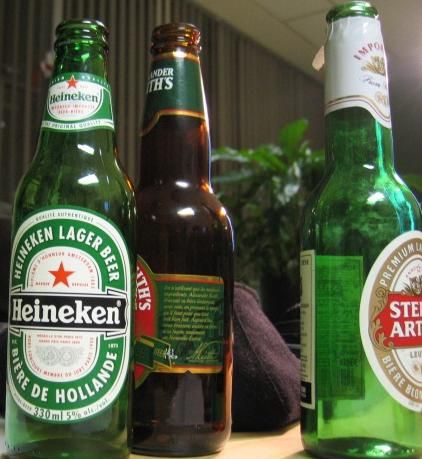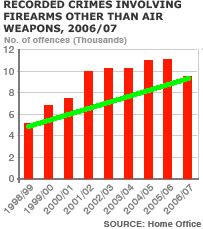One Part of the Jigsaw

A legitimate form of ID card?
One of the themes of the sequence of violent incidents listed in the highlighted post was that among the catalogue perpetrators and victims there was a disproportionate number of the young. This is obviously saddening, and the list is not one of statistically significant length, but it tallies all too well with many people's real world experiences. This is not to demonise the young, the vast majority of whom are no more of a problem to society than I was at that age; occasionally a nuisance, but never really a problem. There is however clearly a subset who cause a disproportionate amount of problems to society.
Let's make one thing clear. This subset always existed, but where they would once hang around smoking they now linger round bus stops off their face on cheap alcohol, where they once might have indulged in petty shoplifting they now make more money from drugs, where they once might have been fought each other with fists they now carry knives or worse and don't really care who they use them on. Most of all, in the majority of cases, while once they knew there was a line which they knew once crossed would bring with it the intervention of adult authority; now they know their rights, the weakness of the criminal justice system and the number of their solicitor.
The damage this limited group cause to their own peers is not confined to the direct wrongs they may inflict, but also extends to an increasingly intolerant society to all young people. As I posted a few weeks ago, one of the most important ways you can get teenagers to engage in society is by giving them the right blend of rights and responsibilities in the management of their own lives as soon as they are capable of exercising them within the broad bounds that the reasonable adult world which they are about to enter has the right to expect them to. When you see some of the activities of the feral minority it makes it hard to believe in this principle, but believe in it I still do.
At the end of the day I still believe that the vast majority of people respond best to the challenges that life throws at them when given the greatest possible liberty to make their own choices. When forced or compelled even the most reasonable people can become resentful, especially if the heavy handed intervention of the state is down to a minority. It is impossible though not to consider what should be done about those that exercise those freedoms in a way that goes far beyond the limits of even the most reasonable and tolerant societies, and whose end result is the emergence of wholly unacceptable subcultures within which are found the roots of the evils of the last few days.
I should also say that, while considering myself a libertarian first and foremost, I am not part of that stream of thought that exactly the set same of fundamental liberties that should be offered to adults should also be offered, unrestricted, to children. Without the ability to fully comprehend the consequences of a decision, it is not reasonable to allow a child to have carte blanche to make some decisions. In the ideal world a responsible parent or guardian will act as a proxy in these situations, but we must accept the reality that in a minority of cases no such responsible person exists and we must reluctantly accept the role of agents of the state to fill the role.
I believe that it is in a understanding of basic principals such as these may lie one small part of the solution, and in particular the significance of that point where society hands over fully the rights and responsibilities over someone's life to the individual themselves.
Today, other than in the obvious cases of the age of consent and a few other examples, that point is almost universally at the point an individual reaches eighteen years of age. But when you really think about it, does that make any real sense whatsoever? We were all eighteen once, and to say that everyone was pretty much on some magic plateau with the same level of maturity is absolute bollocks.
Most of the rights offered are keenly sought, especially driving and access to the increasingly limited number of pubs and clubs without an over twenty-one policy; I suspect that sadly the right to vote is felt to be less important but still has symbolic importance. The ability to do any of these things responsibly at the age of eighteen will inevitably be highly variable.
Over recent weeks David Cameron's team have been making some encouraging noises that show they understand this issue. I'm not entirely sure that the idea of suspending driving licenses in of itself would be enough, but I think a wider concept of being able to suspend the privileges of adulthood for a certain time could be effective.
The problem is with the driving license idea is that it would be too hard to police effectively, especially considering the current attitude where the police prefer to focus on those motoring offences that can be policed with a camera and a database.

Sorry, you're just not ready
I hate the concept of ID cards with a passion, but for reasons of practicality and with extremely limited purposes, various forms of ID card do exist for young people to prove their age. Imagine that for anyone between 16 and 21 that a single properly managed card could be endorsed by order of the court, indicating that the person in question may be 18 but as evidenced by their behaviour they are not yet to be treated as being capable of exercising their adult rights and freedoms.
Such an endorsement could perhaps be extended as far as the age of 21.
Couple this with a crackdown on pubs, bars and clubs to force them to check this ID card and refuse service to those so endorsed. The same could go for applying for a driving license, voting, buying cigarettes and alcohol down the local off-license and so forth, possibly also to the right to chose you own educational choices at 16.
In there could be a genuine deterrent. Who wants to be among the few people that can't go clubbing because they had shown that they still just behaved like a child and therefore were being still treated like one? Perhaps we may even begin to turn around the direction that peer pressure currently presses.
The endorsement would not be like an ASBO, because there is no pride in not being able to do the kind of things your more mature and sensible friends can quite legally do. It would also be a very genuine punishment, and keep them away from the kind of situations where in their immaturity they could seriously impinge on the rights of others, without the negatives of custodial sentences, or the derision with which many other community punishments attract.
The underlying principle is that the age of adulthood becomes a movable feast.
Those who cannot yet understand the boundaries of how an adult should behave shall not receive the liberties of adulthood at the same time as those who can.
It's pretty draconian in a way, but there is a very real problem. What I'd really like to do is leaven it with some real additional freedoms for those who have not proved themselves incapable of handling them. I can't think of something completely appropriate as yet, but I'm working on it as the majority of well behaved young people, I am sure, could handle some greater freedoms, and they are not just as much, but more affected by the misdeeds of a tiny minority.
As a society we need to distinguish between the two, and offer the maximum freedoms to to those who can handle it, as much as we must emphasise the unacceptability of the behaviour of those who cannot.










 RSS Feed - Main Blog
RSS Feed - Main Blog






